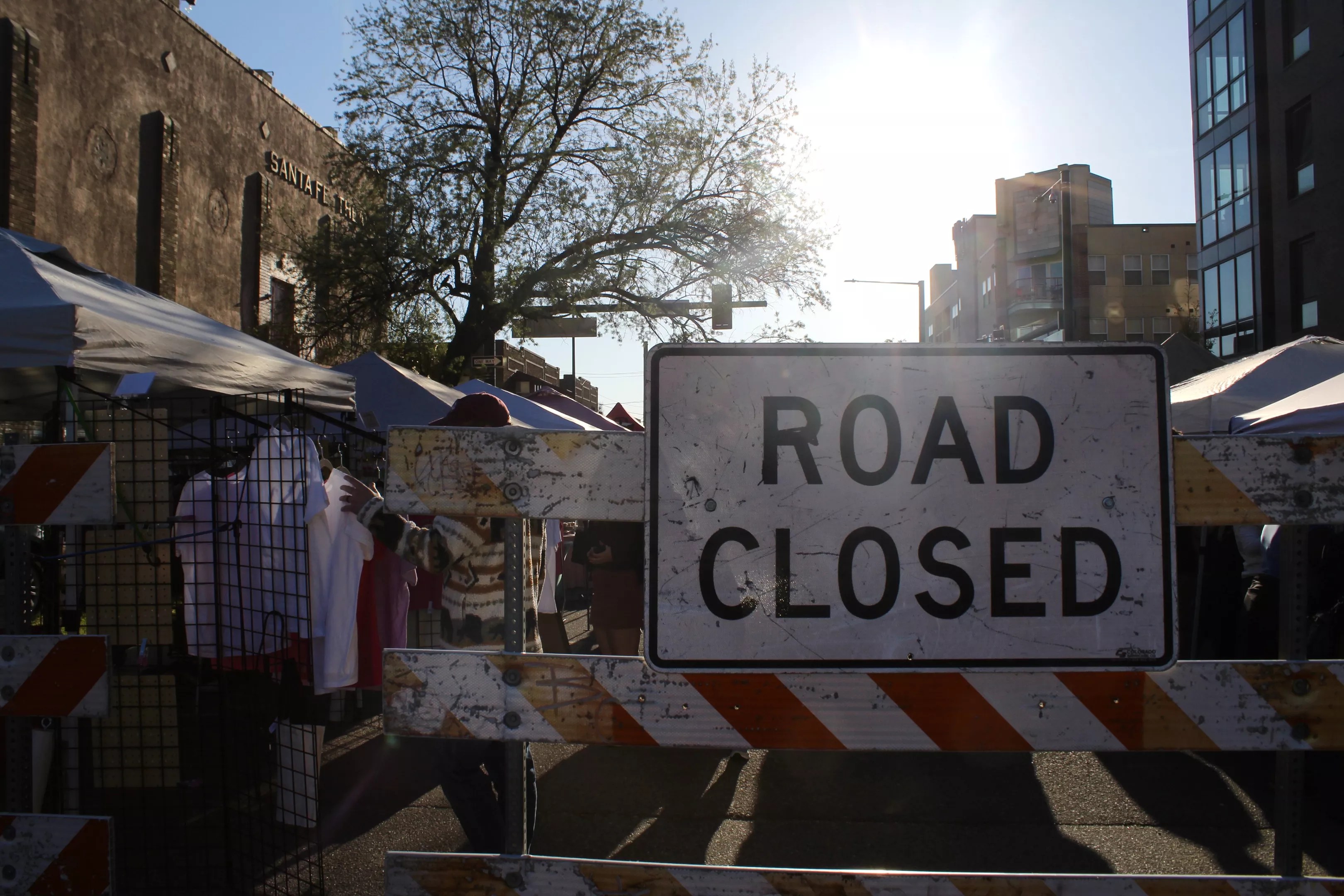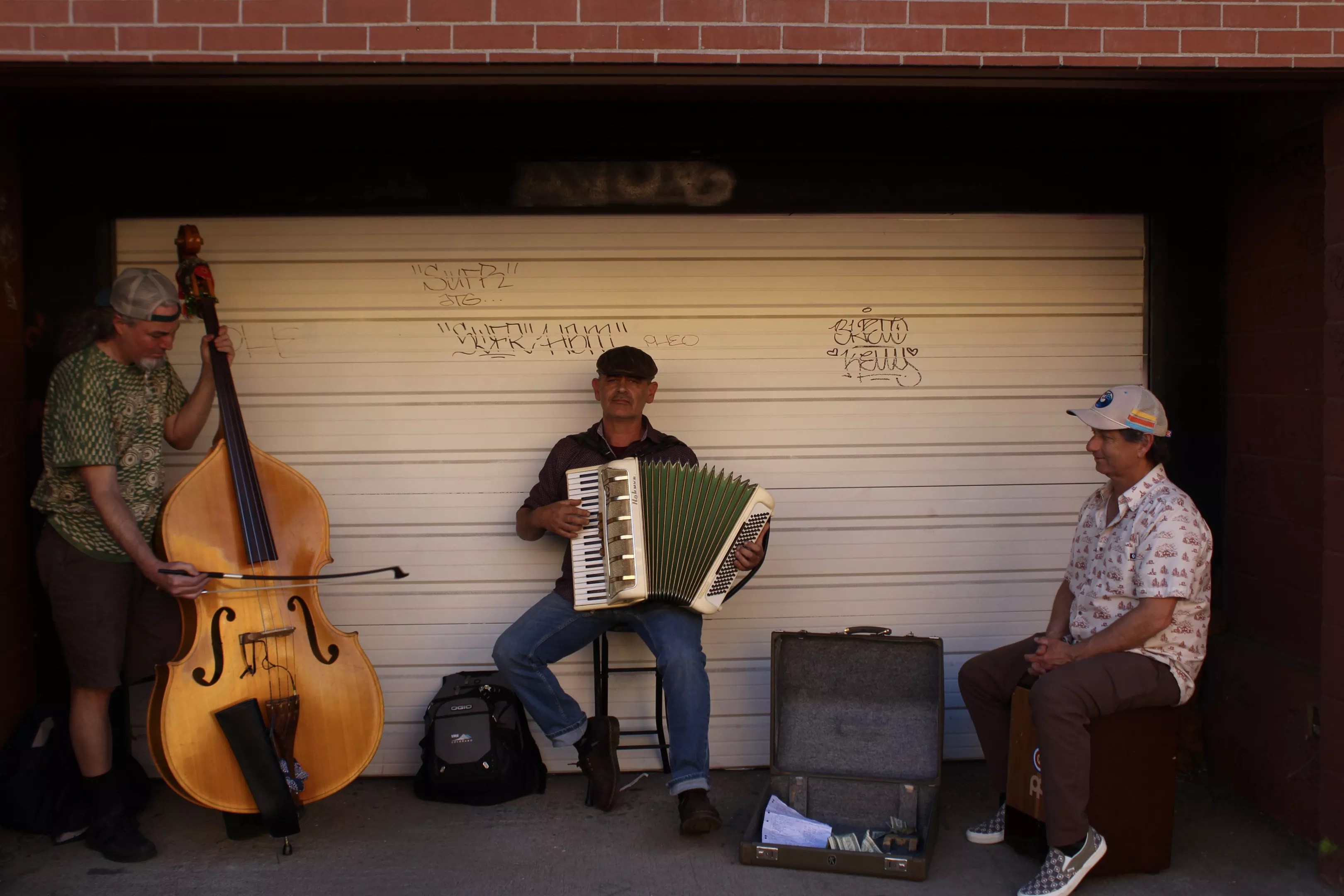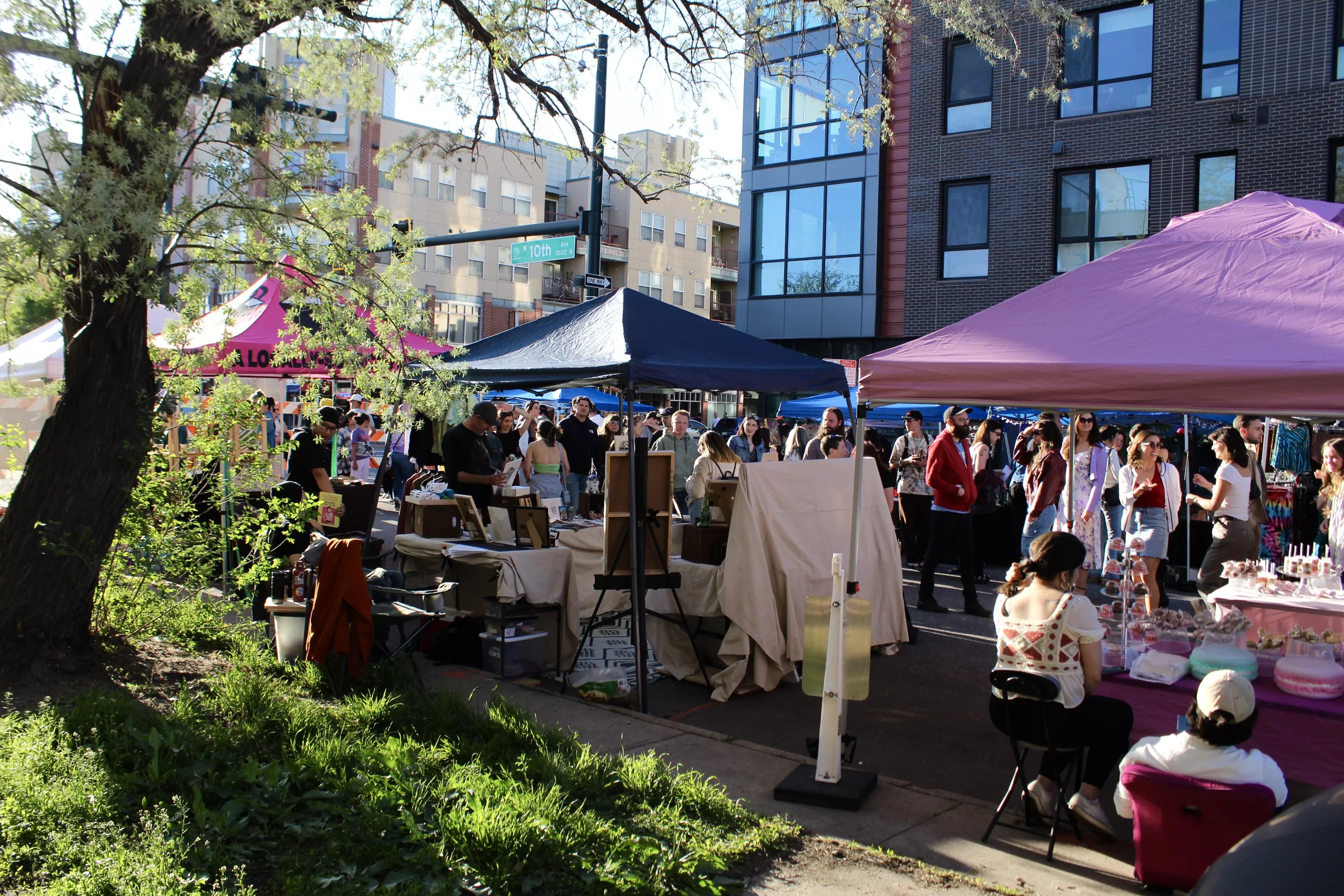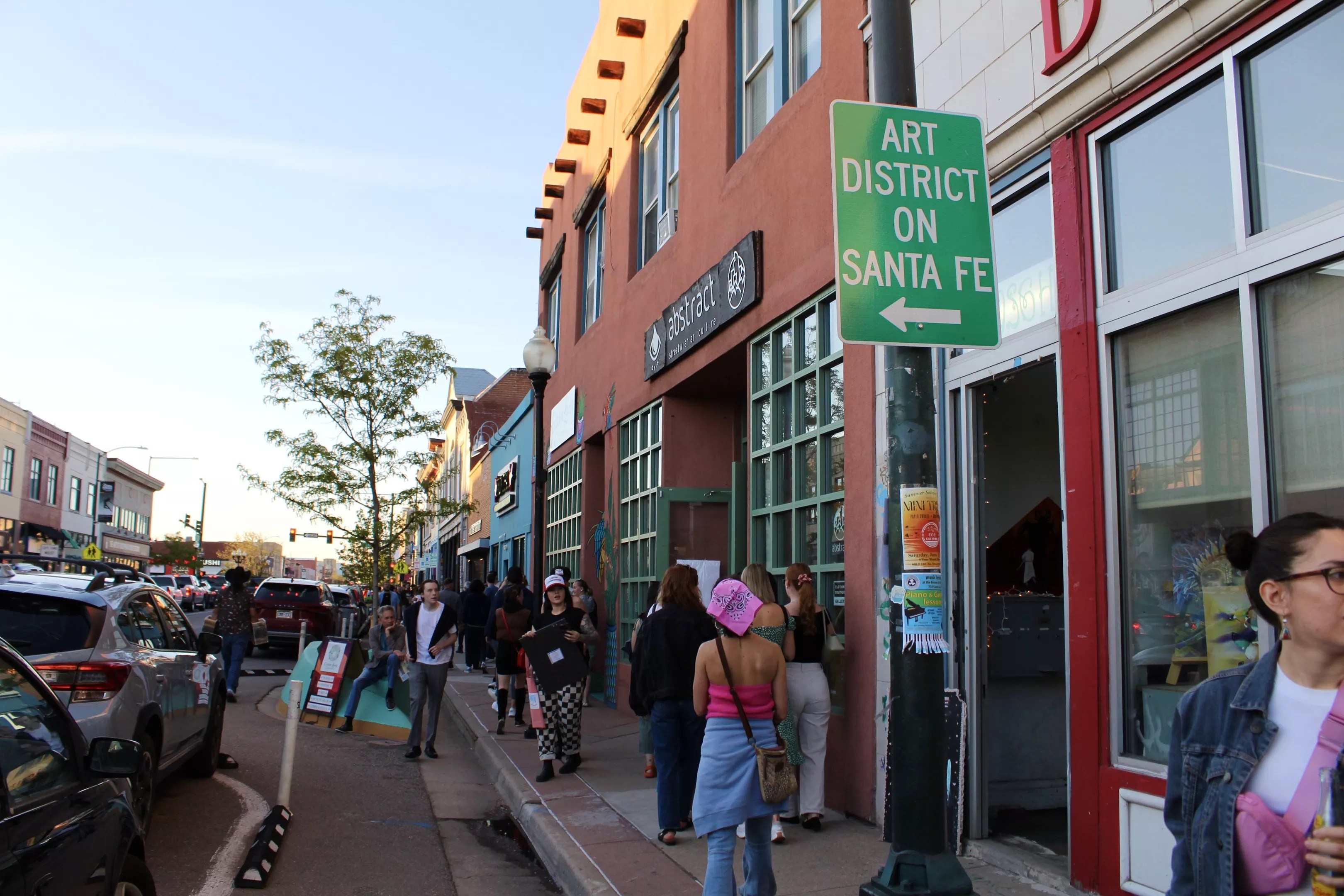
Kristen Fiore

Audio By Carbonatix
As the sun sets over First Friday in the Art District on Santa Fe, cars squeeze into parking spots on the street, people file in and out of galleries, and hints of something fried waft in the spring breeze. The narrow sidewalks quickly become congested with the customary slow walkers and people trying to get around them, and everyone is stopped by rush hour traffic at the end of each block, regardless of their pace.
Save for a few lone buskers, Santa Fe Drive is oddly quiet. There are no poets typing verses or artists standing behind tables of carefully arranged prints. Not anymore.

Lone buskers who found a nook to perform in on Santa Fe Drive.
Kristen Fiore
This is what happens when an event grows beyond its coordinators’ capacity, resources and infrastructure. Artists and other performers along Santa Fe contributed to the creative chaos that many First Friday-goers had come to love and expect, but that also led to issues with inaccessible sidewalks and illegal vending practices, according to the ADSF.
So for the First Friday on May 2, the district got organized and permitted the art walks as special events. This meant that vending would no longer be a free-for-all. Instead, artists hoping to sell their wares would have to pay $50 to register for a vending spot (which were all taken for the year by April 25) on specified side streets and wouldn’t be allowed to set up on Santa Fe. While Santa Fe wouldn’t be closed to traffic, these side streets would be.
“This whole new system is a direct result of organizing and consensus from a majority of our members, all local small businesses,” says Ana Paula Pinto, ADSF director of programs and operations. “It came about after local businesses who struggled with vendors came forward to the Art District on Santa Fe board with concerns, and then were directly involved in designating and advocating for this new First Friday process with our team.”
The goal was to compromise with local artists who don’t show in galleries or own businesses in the district while maintaining sidewalk and business accessibility; the city was also concerned about safety. “All of this is the result of over a year of open conversations, brainstorming and requests for feedback with our members,” she adds.
“I think the art district could’ve done better about coming through and getting everybody’s stance,” says Dave Roggeman, owner of Abstract Denver. “They didn’t ask the community, they didn’t ask us. Yes, it’s in the meetings and I can read the notes from the meetings, but…” he trails off. “It doesn’t feel like the art district anymore. Customers have been asking, ‘Where are all the vendors?'”
The vendors are behind barricades on portions of Seventh, Ninth and Tenth avenues.

A designated vending area.
Kristen Fiore
One of them is Isabella Briganti, an artist set up at a small table with neat stacks of illustrations and handmade bags, her booth tucked in the very back corner of a row of vendors. The May First Friday was Briganti’s first as a vendor, official or otherwise.
“I do like that they’ve closed off parts of the street,” she says. “They had said that the reason for it was vendors were blocking access to galleries, and that makes sense to me. I will say, I’m mad about this spot. The vending fee was the same for everyone. I paid $50, and so did the person on the corner right next to the actual Santa Fe street. And I got banished.”
Vendors were not able to pick a spot when they registered, they were assigned one randomly, she says.
Meanwhile, artist Max Coleman, who’d previously talked to Westword about the changes, has relocated to the corner of Santa Fe and Seventh after being asked to move off Santa Fe by an ADSF official. “The arts district representatives kicked us all out,” he says. “I tried to set up in the planter since it wasn’t on the sidewalk, and they kicked us out of there, too.”

Artist Max Coleman shows off his “Keep Santa Fe Free” hat.
Kristen Fiore
He’s wearing a hat printed on the fly by Roggeman that says “Keep Santa Fe Free.” “Every single person I talked to was like, ‘Why are you packing up, where are you going?'” he says. “And I said, ‘They’re kicking us off of Santa Fe,’ and everyone was really bummed.”
Coleman adds that the official was polite and allowed him to move his table to the corner, even though he hadn’t paid $50. But his sales are taking a hit. He looks across the street to the barricade, where the vendors who registered for a spot are situated. “And they’re the chosen ones over there,” he says.
While some people are mourning the loss of the vendors along Santa Fe, others are breathing a sigh of relief. Damon McLeese, executive director of Access Gallery, says he’s all for free enterprise, but vendors setting up on the sidewalks were creating accessibility problems.
“We have the added bonus of our mission is to increase arts access for people with disabilities, so if a wheelchair can’t get down the sidewalk to get into our business, it creates a challenge for us that maybe some businesses don’t think about, but we do,” he says. “I am for the changes simply because it’s a safety issue.”
Access Gallery has been in its ADSF location for twenty years, and McLeese says that at least once a month, he hears of accidents and people being hit by cars. “People fly down Santa Fe, it is a major thoroughfare,” he says. “They’re not slowing down because it’s First Friday. It’s also dark on First Friday. There’s a lot of people crossing the road. The street vendors add one more element where something could go wrong very quickly.”

A poster hung in the ADSF.
Courtesy of Max Coleman
Kelly Eigenberger, program director at ReCreative, is excited about the changes. She attends the ADSF board meetings and says that tensions between vendors and businesses during First Friday came up as a complaint all the time. “I cannot tell you how much bitching occurs in those meetings every month and people asking, ‘What are you going to do about this?'” she says.
She thinks the $50 vending fee is reasonable – “I’m charging $100 for a market we have coming up,” she says – and notes that there’s more space along the side streets than there would be along Santa Fe.
So this First Friday feels like a win to her.
“It takes some of the pressure off the sidewalks, which are jacked,” she adds. “The sidewalks in this district are really bad. It’s only going to help accessibility and getting people into the businesses. First Friday is for everybody, and space is a really hot commodity.”
A hot commodity that’s led to a cluster of challenges.
Pinto is ADSF’s only full-time staff member, and she notes that ADSF is a very small nonprofit. A nonprofit with limited manpower and money to organize a popular event, as a new episode of City Cast pointed out earlier in the day. Why not just close the street every First Friday, and not just for the one in August? That would open up space and eliminate most traffic hazards.

Pedestrians were stopped by rush hour traffic at each block during First Friday in the ADSF.
Kristen Fiore
“I think it would be a great solution to close the block,” Roggeman says. Although it’s a popular road to travel, he believes that if people knew it would close for the event, they would be able to find alternative routes.
But for some businesses, closing Santa Fe is a major concern.
“What I know from those meetings is that almost all of us lose money during the August First Friday,” Eigenberger says. “That’s because all the vendors are through the middle, so then nobody comes on the side. They’ve been doing it for years, and every summer, every meeting is always, ‘August First Friday we all lose money.’ And Ana Paula says, ‘I hear you, we’re trying to figure it out.’ So the fact that this is coming to fruition is really a testament to the work that they’re doing. …First Fridays are important and they’re really fun, but to have all the galleries go through the effort and go through the motions, opening their doors and getting ready but having sales be less than normal, is kind of a bummer.”
It’s too early to tell how this new format, which will be in place in June, July and September (August’s First Friday is still under discussion), will affect sales. Vendor registration protocol is “a vital tool to bringing order to First Fridays,” says Jackie Bouvier, a member of the BID.
“Our intention is not to discourage vendors, but to uplift them in a way that complements the district’s infrastructure and ensures long-term sustainability,” Bouvier adds.

People walk along the vendor-free sidewalks along Santa Fe Drive during First Friday.
Kristen Fiore
While Roggeman isn’t happy about the changes, he says that Pinto wants to sit down with him, Coleman and maybe some other artists and business owners to see if there is a solution they can come up with that satisfies the city, allows the vendors and businesses to work together, and preserves the heart of Santa Fe.
“Hopefully, we can come to some sort of solution, because it doesn’t feel right down here today,” he says.
Eigenberger feels differently. “If the goal is opportunity for more people, that’s happening today,” she says. “That’s the mission.”